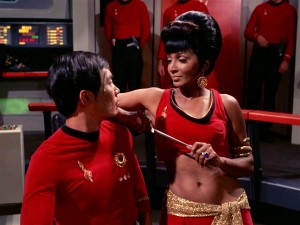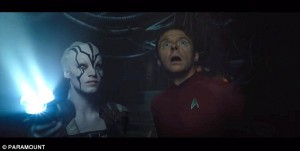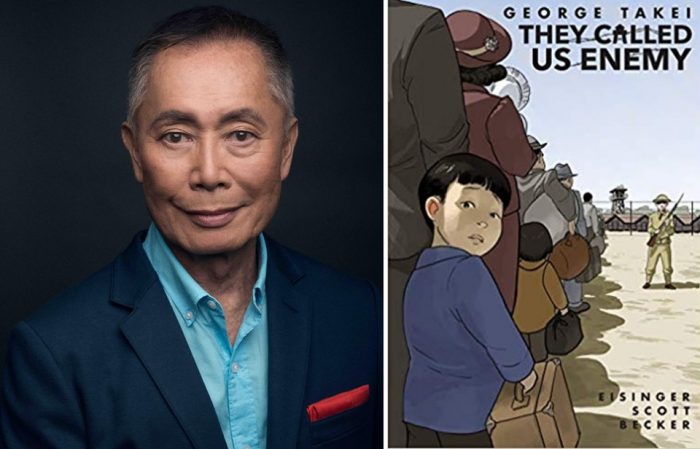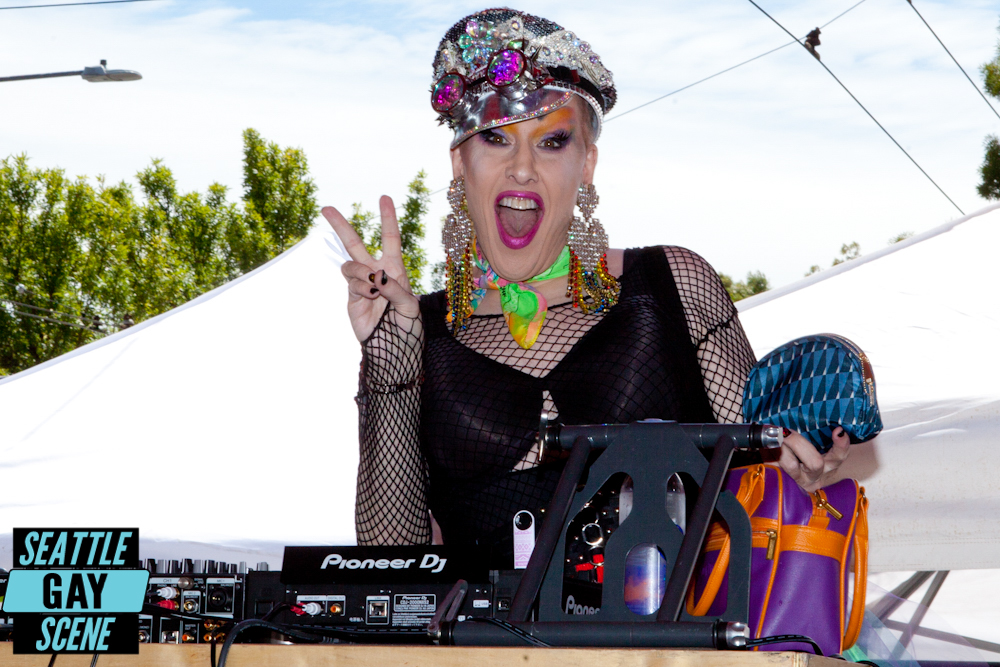If you’re following any of the Star Trek: Beyond news lately, you may have read the controversy this week regarding top ST players disagreeing over Sulu’s new sexuality.
The movie premiered in Sydney, Australia, July 7. U.S. release will be the 22nd, directly after the first premiere at San Diego Comic Con. Social media and various sources report that the actors’ gathering was bittersweet without the presence of deceased star Anton Yelchin, who played Chekov.
The original Mr. Sulu, however, our Dear Uncle George Takei, expressed that he’s not keen on the new Sulu being portrayed as a gay man. According to The Hollywood Reporter, “‘I said, ‘This movie is going to be coming out on the 50th anniversary of Star Trek, the 50th anniversary of paying tribute to Gene Roddenberry, the man whose vision it was carried us through half a century. Honor him and create a new character. I urged them. He left me feeling that that was going to happen,’ Takei says.” Apparently Takei was reacting to not only his lifetime of bringing Hikaru Sulu’s character to screens large and small, but to the original series canon. We love him, to be sure, but he knew why Gene Roddenberry didn’t address Sulu’s sexuality on the first Star Trek series. As the Reporter goes on to reiterate the old tale, Roddenberry was already under pressure from the network due to low ratings, and he believed pushing the social envelope much further than TV’s first interracial kiss would’ve been a surefire way to get the show cancelled.
 Looking back, I can’t say I blame him for his point of view. There was a TOS episode wherein Sulu came on to Uhura, but circumstances were strained and timey-wimey parallel-universey (“Mirror, Mirror”). Many fans argue that Sulu was one of the most non-sexual characters during the length of the series, but going forward in the films and books, he had a daughter, Demora, and her mother was revealed.
Looking back, I can’t say I blame him for his point of view. There was a TOS episode wherein Sulu came on to Uhura, but circumstances were strained and timey-wimey parallel-universey (“Mirror, Mirror”). Many fans argue that Sulu was one of the most non-sexual characters during the length of the series, but going forward in the films and books, he had a daughter, Demora, and her mother was revealed.
On the other hand, the new, rebooted films are the J.J.-Abrams-verse. Star Trek: Into Darkness (2013) officially set the timeline into a parallel canon, with Kirk’s greatest enemy, Khan, complete with a Leonard Nimoy cameo as Spock Prime. For further info as to the correct Star Trek timeline, I encourage all Trekkies to visit the current exhibit at the EMP (Star Trek: Exploring New Worlds). In said universe, why couldn’t we have a gay Sulu? A reporter in Australia who saw the film mentioned that the character’s coming out is nothing more than a picture of him and his male partner with their daughter.
And what does John Cho say about his own character’s reveal? CBS reported: ‘I liked the approach, which was not to make a big thing out of it, which is where I hope we are going as a species, to not politicize one’s personal orientations,’ he said.”
Seems simple and subtle enough, doesn’t it? A nonchalant mention, rather than any one character’s (old or new) sexuality being wrapped up in how the character is shaped or how the other characters react to it. It’s actually been a pretty growing trend in fictional media lately: Game of Thrones, The Legend of Korra, a plethora of TV commercials in the past couple of years, Finding Dory, Torchwood, Doctor Who, The Walking Dead, etc. have made it a point not to make sexuality the point. A character has a love interest or partner, and it’s more like an afterthought that the couple is same-sex. Another character may make a slight remark, but the sexuality isn’t the primary plot arc.
There are some who say that this type of storytelling does a disservice to the LGBTQIA struggle for representation in the media. Our stories should be told, they should make those outside our experiences uncomfortable, and it be would nice, for once, to show a same-sex couple be happy and, you know, not die (can we say “trope”?). Yet in Beyond, it seems as though we may get at the very least a slight break from the trope. It’s not been revealed so far if Sulu dies in the film, and truthfully I doubt that would happen in the near future. He’s a core crewmember, who happens to be married to a man.
Simon Pegg, the film’s screenwriter and Chief Engineer Scotty, responded to Takei a day later:
He’s right, it is unfortunate, it’s unfortunate that the screen version of the most inclusive, tolerant universe in science fiction hasn’t featured an LGBT character until now. We could have introduced a new gay character, but he or she would have been primarily defined by their sexuality, seen as the ‘gay character’, rather than simply for who they are, and isn’t that tokenism?
Justin Lin, Doug Jung and I loved the idea of it being someone we already knew because the audience have a pre-existing opinion of that character as a human being, unaffected by any prejudice. Their sexual orientation is just one of many personal aspects, not the defining characteristic. Also, the audience would infer that there has been an LGBT presence in the Trek Universe from the beginning (at least in the Kelvin timeline), that a gay hero isn’t something new or strange. It’s also important to note that at no point do we suggest that our Sulu was ever closeted, why would he need to be? It’s just hasn’t come up before.
…
Our Trek is an alternate timeline with alternate details. Whatever magic ingredient determines our sexuality was different for Sulu in our timeline. I like this idea because it suggests that in a hypothetical multiverse, across an infinite matrix of alternate realities, we are all LGBT somewhere.
Whatever dimension we inhabit, we all just want to be loved by those we love (and I love George Takei). I can’t speak for every reality but that must surely true of this one. Live long and prosper.
I can see both sides of the coin here, but honestly I’m overjoyed that the reboots, which are made for a new generation of Trek fans—and, as aforementioned, a *new fucking canon*—finally have a gay character. Perhaps there’s hope that there’ll be people of alternative sexualities and gender expressions on the new Star Trek series set to premiere in January 2017. Also, HELLO ASIAN QUEER INTERSECTIONALITY REPRESENTATION.
What say you, Trekkies? Does it matter how subtle or blatant a gay character is portrayed in fictional media? Or does it depend on the story? Would you have preferred a new character in the Trek-verse, or do you love a gay Sulu? Is his sexuality true to his character, or does it not matter because of the canon?
As a whole, this little fangirl is hoping for the best from Simon Pegg. I truly believe he has excellent intentions and progress is being made toward the Star Trek vision Roddenberry purportedly hoped for. The director, however, I’m a bit more skeptical about. I mean, his primary credit is The Fast and the Furious series. So we can expect decent action sequences, but let’s hope the writing brings a bit of gravitas to the story. Thankfully, as the third in the rebooted series, the actors are settled into their characters.
Regardless, moment of silence for Anton Yelchin, please.



















